
When Baby Boomers Create a Second-Act Career
After spending years advancing in their careers, many seasoned professionals debut in second acts that combine purpose with a paycheque.
Antoine Tirard and Claire Harbour
The average life expectancy is growing apace across the globe. It was clocked at over 71 in the years of 2010-2013, and this figure includes war- and HIV-ravaged countries in Africa where it can be as low as just under 50. With this seismic change continuing, most of us face the prospect of working in some shape or form until we are way over the traditional retirement age of sixty. This may be partly due to increasing obligations to work until the age deemed appropriate by our governments, and thus our employers. However, there is also the possibility of using the years at or towards the end of our more traditional employment years for other activities. Instead of reaching immediately for the golf clubs or the gentle walking groups, we increasingly choose to do “more”. The resultant “encore careers”, or “second acts”, as they have become known, make for a fulfilling time, regardless of the route by which they were reached. In this article, we looked at five baby boomers from around the world enjoying a satisfying finale. We discovered that some of them do not even regard this round as the finale at all.
Steve Perkins looks very much like the classic case of an encore career. He had spent his entire career in the advertising industry, mostly in New York, where he eventually led media departments, and lapped up the glamour, the rush and the pressure of his industry. However, when he and his wife decided to seek out a calmer place in which to raise a family, he took a role as account director in a large Chicago firm. Three firms and hectic roles later, when their twins were born, Steve decided to go part-time, in order to help out on the home front. He was, as he admits, starting to feel burnout anyway. It was clear to him that spending more time with family was a greater priority than selling more advertising. His next move was to head the marketing department at the Frank Lloyd Wright Home and Studio. In this role, Steve came to love cause marketing, and started to feel that he was working with a purpose, not minding the huge drop in pay. However, in a reorganisation, his entire department was laid off and he was faced with an unexpected choice to make about the next step. This was the ideal opportunity for him to develop further his increasing appetite for making a difference, and he took a huge step.
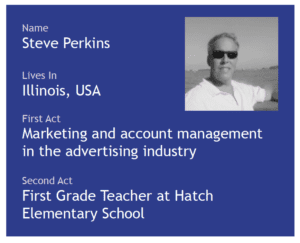
Steve had long been on the board of his children’s school, and had also taken on a role in another local non-profit organisation – so he was already turned firmly towards public service. As he says, “the time I had after being laid off gave the idea of making a difference time to take a hold”. He felt that teaching might be the solution. He was friendly with another ‘dad’ who had recently switched careers to teach and was able to obtain first hand feedback about the process. This was enough to encourage him to go back to school and start teaching in 2013, in a first grade classroom.
Try It Out
Steve now says he wishes he had made the move ten years ago. He states that he “absolutely loves” his work, with a sense that he is on stage all day every day, and that the performing is what he enjoys. He also thrives in the community of teaching colleagues, and sees that there are a number of transferable skills he brought from his corporate experience. He likens the communication with the students to that of dealing with multiple constituencies in the business world, and suggests that planning a teaching day is similar to gearing up to a big presentation each day.
The advice that Steve has to offer those considering this kind of move is mainly around getting information and ideas. “Get in a classroom”, he suggests, “or wherever you want to be, and try it out!” But he is quick to add that it’s very different to a corporate job. “You feel like you are kind a performer who is ‘on’ all day and you really have to have a lot of patience and be able to multitask. There are some days when I kind of have to get into the groove of dealing with young kids which can be stressful but the upside is that the kids are so much fun and you really feel like you are doing an important job and making a difference in their lives.”
The other unexpected benefit that Steve notes is that in his community, teachers are held in very high regard. He is proud to be working in a profession that is admired, whereas, despite his lofty role, previously he was perceived as “just a salesman”.
Gayle Malone started her career in IT sales. Her mother was a lifetime IBM-er, and Gayle grew up intending to avoid the same fate. However with studying mathematics and computer science at UCSB in California, she accepted a job with the upstart computer organization at HP! She moved her way rapidly up the company, becoming a manager at 25, and joining the pioneering consulting arm of the company shortly thereafter. Global responsibilities came along, and she was extremely happy with her progress. However, the well-known changes in the HP organisation took on speed, and she became more and more frustrated by the culture changes and other developments.
So when Gayle was offered a “phased” retirement at the age of 56, she was very tempted. Her husband is a little older than her and the couple figured that this could be a real opportunity for them. Having done some careful calculations to understand the implications fully, Gayle went ahead and accepted the offer. However, in her mind, her career was most definitely not over.
She met a representative from the Encore Fellowships Network, a program of Encore.org, which works in collaboration with corporations to offer ‘fellowships’ to retirees, allowing them to bring their skills to non-profit organisations, while earning a stipend. Gayle liked the idea and while she saw it as something to do “later on”, they called her with an ideal offer. She felt compelled to accept the role she was offered at Second Harvest, a large and highly regarded food bank in the San Francisco Bay area , not least because they had an excellent reputation for “value per donation” and because they were looking for a program-creator like her. She is helping them evaluate and develop a program to increase donor engagement and commitment, focusing presently on donors with children.
Pleasant Surprises
The recruitment process surprised Gayle by its thoroughness, as she was put through many interviews, and she took a frank and honest approach throughout, telling them as much as she could about all that she did not know about the non-profit world. At the end of the process, while she felt it was rather early, since she had only had six months off with her husband, she took the offer. This was a chance to do something using her skills beyond consulting, which she had already decided she did not want to do. The couple were delighted that she would be doing something fulfilling, and even bringing in a modest salary. As she says, “you cannot play for forty hours per week!”
The discovery of this new environment has been full of pleasant surprises for Gayle. She is thrilled to encounter people who are not ridden with politics, and tells the story of how she was suggesting that perhaps donor families would be motivated to give more if they could engage with children in need. Instead of the resistance to change that would have been the likely initial reaction in a corporate setting, she saw eyes lighting up, and heard many ask what they could do to make this happen.
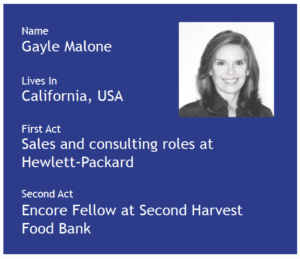
An important part of becoming oriented to Second Harvest has consisted of going out in the field to get to know the different services. Her encounter with an 89 year old volunteer left her thoughtful and inspired, especially as the fit lady in question explained that she could only volunteer for a few hours in the early morning, as after that, she needed to go to her day job, running a 70-unit condominium! Another aspect of great satisfaction is that Gayle feels included. This is best exemplified by the fact that she has been given access to quarterly strategy meetings, and to all the senior members of the organisation.
Gayle has a lot of advice to offer to aspiring encore career candidates. She firstly says that if at all possible, it is better to do this kind of volunteering through the encore fellowships or other similar arrangements. In this way, you are likely to be given greater responsibilities, as well as 10-15% of your former salary. Her other big piece of advice is of critical importance: “if you like to be recognised for your past achievements and career expertise, then do consulting; if you are willing to learn new things, then Encore programmes are really rewarding. If you are humble and willing to learn, then the non-profits will be very appreciative indeed”. She speaks fondly of feeling that she has found once again the feeling of “just loving” what she does, and may well find it hard to ease out once her statutory year is over.
John Rice, another encore programme fellow, has already finished the projects he did within the programme. And his vision is possibly slightly less enamoured than Gayle’s. After a long career, exclusively at Procter & Gamble, in the product and R&D functions, moving from engineering-driven roles in Florida, to global roles in Germany, from pulp to paper, and from junior to expert, he felt he had more or less “seen it all”. The excitement and challenge of his role in Germany, as global head of R&D for a baby product, were difficult to replace, and John also realised that he was less interested in running large teams than he was in organisational capability and how he could contribute to that. In that vein, he spent several years in the US, on return from Europe, trying to find a role that suited him, to no avail.
At that point, the first of several rounds of early retirement was announced, and John decided to take advantage. Like Gayle, he did not see his career as being over, and he started to look for other opportunities. P&G offered him the standard exit package, which included a time of consulting and advice from an outsourcing company, which he describes as “not particularly effective” for him, although he does admit that the process allowed him to take the time and effort to reflect and to look for more.
In his thinking about what was important, John remembered that he had a love for the environment and the outdoors, and this started to shape his search for the next challenge. He hit on the sector of renewable and clean energy, and began to look for roles within this area. However, this was not to be, despite making a few applications. At that point, a lunch meeting with a friend revealed an opportunity he had not been expecting.
Network Like Crazy
The friend introduced him to another “encore” organisation, this time “YourEncore”, and he agreed to be open to offers that might come in. The first role that John undertook was not a good fit with his skills and experience. But shortly afterwards, he was given the chance to undertake a project to audit some manufacturing locations belonging to P&G, and he leapt at the chance to get back “out in the field”. The travel involved in this audit suited him perfectly. Being out and about was what he loved, and this was a great reminder. The project lasted some time, as there was a great deal of inspection to be done, and it involved John in delving into some more current training and best practice work, so as to deliver the project optimally.
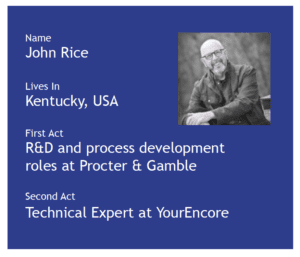
Now the project is over, if John receives other offers of work but he is not entirely sure he would take them. He sees that YourEncore is an organisation that does “great work”, but which also has its drawbacks. He has neither interest nor talent in developing their business for them, and would not take on “just any” project coming in. What he is most proud of is the flexibility he has created in his life, whereby he can do what he wants, according to mood and circumstance, and he is unlikely to give this up soon.
The advice from John? : “Network like crazy!” This is something he admits he failed to do younger, and that is now obviously the most supremely critical part of the process. He started networking much too late, and found it difficult to create his own opportunities. He also advocates “living below your means”. In this way, he says, you can make decisions about what is important, rather than based on fear and ignorance. Ultimately he believes we should all find out what brings us joy, and work towards that, adding that it is never too late, or early, to start.
Daniel Raze is a natural networker, who uses his contacts, his knowledge and the power of the network, to great effect. From a modest background, he was encouraged by his mother to break out of the humdrum, and he showed early signs of commitment to society and its causes, as he was involved in scouting and Abbé Pierre’s charity from teenage onwards. He says that any life lived without commitment is a life half lived.
Having travelled across the world as a young man, Daniel continued to make trips now and then during his lifelong career at Kaufman & Broad, the real estate developer. He requested a sabbatical year at forty five, which caused much consternation on the part of the CEO. Eventually he was able to explore different parts of the world, as well as to explore other opportunities to give back to humanity. He travelled a great deal with his wife, whose painted murals now decorate orphanages and homes in Vietnam, Mexico and more. He also tried volunteering for the “Restos du Coeur”, one of the largest homeless charities in France, but found that frustratingly bureaucratic and inefficient. His true path was not yet clear.
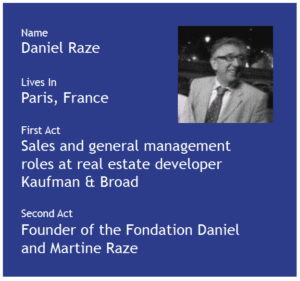
Daniel returned to work and settled down. His absence and the awareness of his motivations afforded him a special sort of “aura”, as he describes it, which allowed him to broaden his professional and social circle considerably. At the age of 58, a few years shy of the normal retirement age, Daniel decided to end his professional career, sensing that it was time to get ready for the next stage of his life’s path. The exact timing was influenced by the fact that his company, previously a large, paternalistic family business, had been bought by a venture capital fund, and the atmosphere was no longer as attractive to him. He set out his plan, which was to give himself and the company a couple of years to manage the transition, to ensure a successor was in place, and for him to make plans for exactly what to do.
His departure just before Christmas was fêted with champagne, but he found himself alone by the time the holidays were over. The satisfaction of identifying the first few projects to which to contribute more than made up for this. It was fortunate that Daniel’s stock options were worth a small fortune, and he had passed them on to the foundation that he set up, thus allowing choices to be made easily about which projects to sponsor. Daniel travelled to a project in Togo and Benin, which attracted his attention, and thus the first money from the Foundation was allocated. More projects followed, and Daniel tries to give his choices a sense, a personal link of some kind.
A Few Hard Questions
An incidental aspect of Daniel’s activity is that of advisor to religious bodies, who have real estate questions to tackle. Daniel’s advice is sought, as a trusted consultant, to ensure the transactions go in the best way possible, and he in his turn makes sure that 30% of his fees are sent straight to the Foundation. He constantly finds new challenges, and seems never to tire of bringing his experience to the benefit of others.
Although it is a constant juggling act, Daniel does make time to visit all projects he sponsors, and makes sure that he can report transparently and positively to the donors. As he moves forward, he aims to continue to motivate more people to donate, and has made plans with his children to continue the work and management of the foundation, when he is no longer able to do so himself. He even has plans for other “retirement type” activities, for once he is over 70! He plans to learn Spanish, to travel more, and to continue to visit projects, even if he is no longer managing the foundation directly himself.
The advice Daniel has for others is simple: “Plan and get passionate!” He cites the CEO of his company, who has just retired, with no visible plan or idea of what to do. “Life is a one way trip.” He recommends making sure to prepare for a long and satisfying time, and to ask a few hard questions of oneself: How can I be useful? What is my place in society? What do I know how to do? What can I usefully learn? What are my constraints and limitations? Daniel sees much time wasted on ventures that do not suit, and tries to reach and advise maturing executives before they take rash decisions.
Finally, he believes it is our duty, as human beings, to keep ourselves not only active after retirement, but also in good physical shape, and looking good through making an effort to dress well. He has seen too many retirees in sweat pants and lonely at home, lost to themselves and to the world. He begs us all to do better than that, for our own sakes, and for humanity! Giving our lives a sense is crucial, according to Daniel, and he seems to embody the energy and bounty that he recommends seeking out.
Arup Ghosh comes from a family of philanthropists, his uncle having worked alongside Mahatma Gandhi, and so it was no surprise to find him volunteering with Mother Teresa as a high school student in his native Calcutta. His energy and commitment to bettering the world are on a par with Daniel’s and his career is actually quite hard to divide into “before” and “second act” stages at all, as he has constantly been involved in the fight to improve the lot of those in need.
While he worked with “Mother”, as he calls her, his strength of character and resolve emerged, as he raised the idea of schooling the children, as well as just feeding them. She actually resisted quite strongly before agreeing to let Arup set up a system to get children into local public schools, despite their “untouchable” status. From this initiative the Tomorrow’s Foundation emerged, and exists to this day, though at the outset Arup’s role was more that of instigator and financier, than anything else.
Taking The Plunge
Arup qualified as a chartered accountant, then obtaining a job with PricewaterhouseCoopers. After earning a Master’s degree, he was all set to head off to the US to do a PhD. It was only on failing to be granted the necessary visa that he realised that he wanted to travel anyway, and a curious series of serendipitous events followed, whereby he was given financing by someone who died shortly after, and was invited by friends in Europe, who initiated him into the basics of the textile and garment industry. He was introduced to the CEOs of Pronuptia, Galeries Lafayette and Christian Lacroix, who found him sufficiently convincing to place some initial orders.
Being far from an expert in the industry, Arup and his twin brother set up a company, to deal with all these orders and more. The Indian economy was opening up, which was a plus, but on the negative side was a great deal of abuse of workers in this “low cost” manufacturing destination. Arup vowed to be different, and set up a social enterprise. He engaged thousands of workers in villages to make the items his European clients had ordered, providing good work conditions, training and education. In no time his company had reached $4M turnover, while he still described himself as a lucky amateur. However, an over ambitious joint venture with a venture capital company a few years ago meant Arup decided to close down.
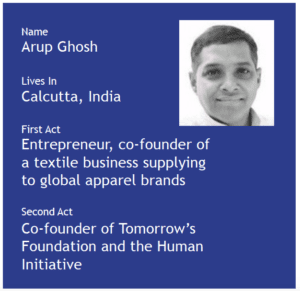
At the same time as this rather unhappy ending, the position of Executive Director came up in the Foundation, and Arup decided to take the plunge. The twenty-fifth anniversary of the company was fast approaching, and it was a great opportunity to take stock, and ensure the future. Arup also explains that he is not particularly enamoured of fashion, and that he was extremely happy and relieved to be able to get back to “giving back”.
Another benefit of the return to the Foundation was that Arup learned to impose increasing humility on himself, and he enjoyed the accountability that was required, both to the Board and to himself. However, by his own admission, Arup is not an “operations man”, but more focused on vision and strategy, so he does not see himself in the position for much longer. He has done his job in refocusing the Foundation and readying it for the future. Now, he is at another crossroads, once again asking himself “what’s next?”
While still in post at the Foundation, Arup has created the Human Initiative, a consultancy focused on CSR initiatives and strategies. He wishes to offer a unique package of expertise to the world at large, particularly in the textile and garment industries, helping them to improve the way they leave their footprints, in every sense. He explains this approach and motivation in the following way: “in India, we don’t see things as separate parts, but as a whole: the material, spiritual and so on are all in the picture together, and what we seek is a balance.” This clearly applies to his overall motivations as much as it does in the setting up of the Human Initiative, and he adds that “it is obvious that you have to help, when you see the reality in front of you every day.”
His reflexions on why and how he has chosen this path are best summarised like this: “I am lucky to have something to share, and I think about the problems of others all the time. How can I best share it?” Now is a great time to be taking this sort of approach, as the Indian government has introduced an obligatory 2% spend on CSR for all corporations, so there will be many takers in the home country as well as from overseas. However, what is even more exciting to Arup is the fact that it is an opportunity to reverse engineer things: for too long the models have come from the West, and now is the time to show the rest of the world what India can do!
Every single subject of this article is to be admired in one way or another. Each one has taken the steps necessary to give back in their own way. We sense that for all of them, the story is not over yet, and there may be many more iterations before any of them picks up the golf clubs or buys the condo at the beach. Is this the new model? Will everyone, sooner or later, view his or her latter years in working life as an opportunity to give? Certainly this group inspires us to believe so, but of course, the road is long, and the key will be to make more noise about this kind of opportunity.
On the corporate side, HR departments could be doing more to help employees who may want to consider a second act career. The examples of HP, Intel or IBM and YourEncore in the US show how companies can actively work with partnering organisations to support retiree transitions to their second act. Indeed, in the US, the “encore” idea is spreading and highly organised, whereas all the Europeans to whom we talked about this article struggled to understand the concept, as it is far from widespread here.
Evidently, as we have seen even in previous articles, many of those lucky enough to be on the wealthy side of the big divide feel moved to build some mechanism to give back, to support those less well off. From here, we believe that there is some hope that the movement will grow, and become an automatic part of all professional careers, imbuing them with true meaning, and positive social impact.
7 Tips To Consider Before You Leap Into Your Next Career Chapter
1 – Reflect, Prepare and Plan
Don’t make rash decisions. Think about the key strengths and skills that made you successful and where you think they could be applied. Clarify what is important to you, where are your passions, what is your place in society and how you can be useful. Take enough time to prepare and create a plan with realistic goals.
2 – Be Ready to Earn Less Money
A large majority of those in encore careers experience gaps in their personal income when they transition, so be prepared to “live below your means”. Change your lifestyle, trim your expenses, and learn to value the intangibles. There is no direct correlation between your salary and your worth to society!
3 – Gather Information and Experiment
Once you have chosen an area to pursue, immerse yourself in industry news, look up organisations that appeal to you and talk to people who work there. When possible, pursue these opportunities while still working as a full-time professional. Try different things. You can begin as a volunteer, fundraiser, event worker, or member of a nonprofit board.
4 – Take Advantage of Programmes and Resources Available
Find out if your employer provides early retirement or similar support packages. Check what is available: encore fellowships, grants or scholarships for training and education. If you are in the US, go to websites dedicated to encore careers: www.encore.org, www.bridgespan.org, www.idealist.org, or www.volunteermatch.org.
5 – Network and Seek Support
Actively network with both older and new connections relevant to your project. Join professional groups online and offline via LinkedIn Groups or others to join in conversations and attend networking events. Coaching might also offer the chance to help you with your search or entire transition.
6 – Adapt to Your New Environment
Be aware of the differences which might be a surprise. If you work for a nonprofit, the culture probably will be different from what you are used to. You won’t get the same budgets or support you had if you have worked for a Fortune 100 company. And since nonprofits focus on getting things done, you will be expected to juggle a number of responsibilities.
7 – Express Your Energy and Passion – and Enjoy
Do your best to promote the active, passionate part of your personality during networking activities and in interviews. Think about your wardrobe and appearance, energy level and the topics you bring up during conversations. Enjoy the journey and the feeling that you have found something you care about and love to do, which has a positive impact on people’s lives.
Sign up
Sign up to receive regular insightful news and advice on managing your career and receive a free gift. Inspiration delivered straight to your Inbox!
